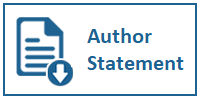DO UNIVERSITY SUPPORT, ENTREPRENEURIAL ATTITUDES, SUBJECTIVE NORMS, AND SELF-EFFICACY INFLUENCE STUDENT ENTREPRENEURIAL INTENTION?
DOI:
https://doi.org/10.31937/manajemen.v14i1.2499Abstract
Abstract- This study aims to examine the effect of university entrepreneurship support on entrepreneurial intentions which are influenced by the mediating effect of entrepreneurial attitudes, subjective norms, and entrepreneurial self-efficacy in undergraduate students studying in Jakarta and or Tangerang. The sampling technique used is the purposive sampling technique where the respondents were undergraduate students in Jakarta and or Tangerang who have entered their universities for at least one year. The sample used in this study comprises 280 respondents with data collection methods in the form of electronic questionnaires. The data was processed using PLS-SEM descriptive analysis using SmartPLS software. The results showed that university entrepreneurship support had a positive influence on entrepreneurial intentions and attitudes toward entrepreneurship, subjective norms, and self-efficacy. The study also showed a significant mediating effect of attitudes and self-efficacy on the positive relationship of university entrepreneurship support to entrepreneurial intentions. The results of this study contribute to showing that the role of education in universities still plays a significant role in the formation of students' self that encourages the emergence of entrepreneurship among undergraduate graduates. Therefore, the formation of programs and a combination of practical training and an entrepreneurial climate at the higher education level need to be a concern for the development of entrepreneurship in developing countries.
Keywords: University Entrepreneurship Support; Subjective Norms; Attitudes; Self-Efficacy; Entrepreneurial Intentions
Downloads
Downloads
Published
How to Cite
Issue
Section
License
Authors retain copyright and grant the journal right of first publication with the work simultaneously licensed under a Creative Commons Attribution-ShareAlike International License (CC-BY-SA 4.0) that allows others to share the work with an acknowledgement of the work's authorship and initial publication in this journal.
Authors are able to enter into separate, additional contractual arrangements for the non-exclusive distribution of the journal's published version of the work (e.g., post it to an institutional repository or publish it in a book), with an acknowledgement of its initial publication in this journal.















